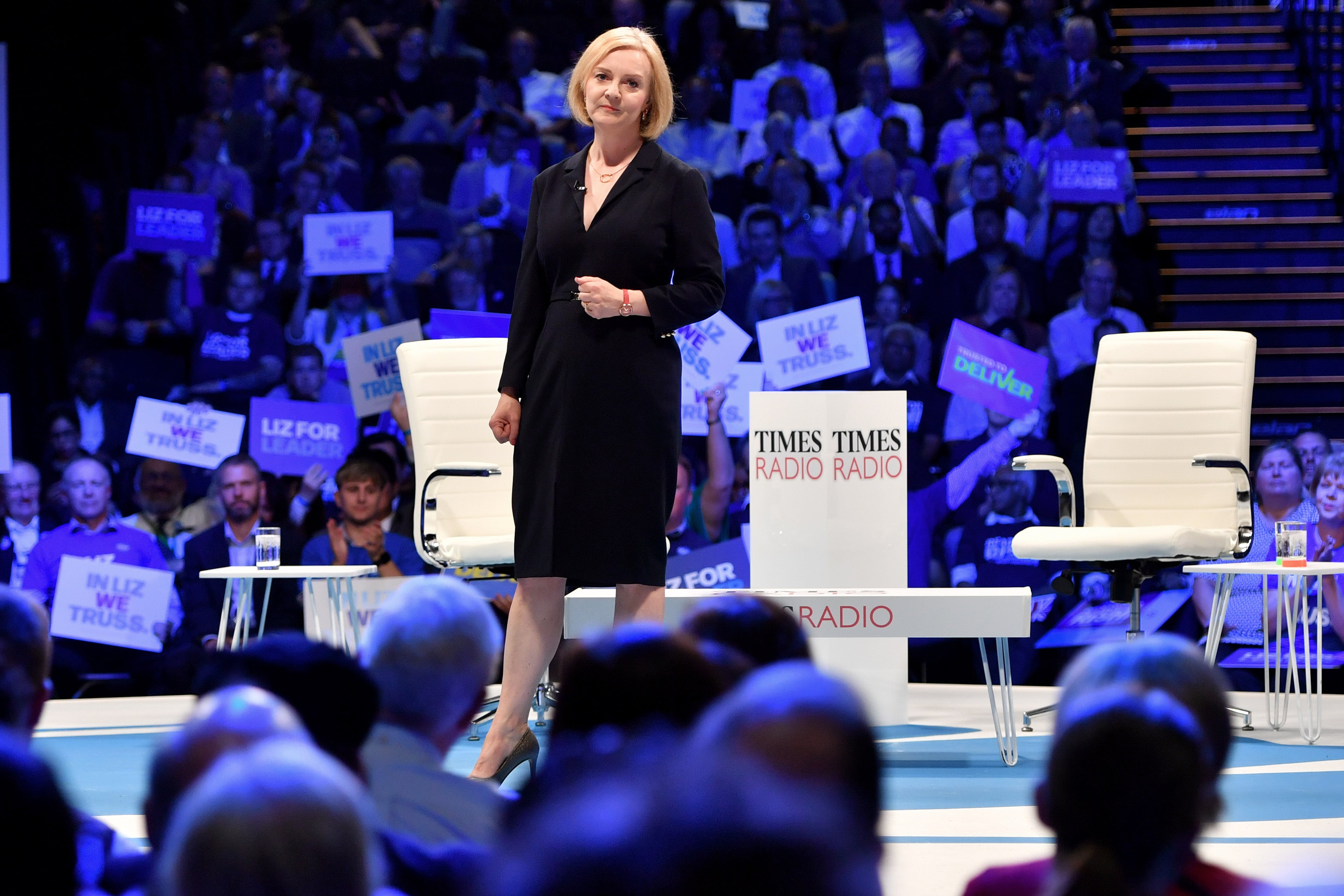Liz Truss’s incoherent promises of tax cuts only mean one thing – more national debt
In the short term – a period that happens to include a general election – Truss is going to spend and borrow as if there is no tomorrow, writes John Rentoul


I don’t want to bore on every day about Liz Truss and the emergency Budget – sorry, I mean “fiscal event” – but she is likely to become prime minister, so what she says and does is important.
Nor will tax cuts be the most significant part of Kwasi Kwarteng’s emergency fiscal event, except to the extent that they form part of the new government’s plan to help people with their energy bills.
The “temporary moratorium on green levies” on energy bills, which journalists delight in reciting along with the candidate at every hustings, is a form of tax cut. That seems simple enough and an obvious candidate for inclusion in the emergency fiscal event, but even that might be caught up in the debate between targeted and universal help that is currently raging among Truss, Kwarteng and their advisers.
For example, Simon Clarke, the chief secretary to the Treasury and one of Truss’s early supporters, ruled out a VAT cut on energy bills in January because it wouldn’t be targeted: “It would mean subsidising some of the fuel consumption of the wealthiest.” That argument applies equally to scrapping the green levies. But I expect that tax cut will go ahead, if only because Truss has repeated the pledge so often. It is worth only £150 off the average bill, so it won’t be enough to offset bills in October that are expected to be £900 higher than when Rishi Sunak announced the last support measures in May.
The big question for the new prime minister is what other help Kwarteng will announce; but there is a secondary issue of what will happen to her other promises of tax cuts – originally a promise of cuts “from day one”, later a promise to “start work” on tax cuts “from day one”.
The main tax cut is a plan to “reverse” the rise in national insurance contributions. As far as I can tell, she has never been asked what she means by this. It is not straightforward, because Sunak has already reversed part of the rise, but he did it in a way that benefited those on lower incomes. The main rates of national insurance went up in April, but then in July, Sunak raised the threshold at which employees start to pay contributions. This left workers on less than average earnings better off than they had been in April. Are Truss and Kwarteng really going to make them worse off, while cutting contributions for the better off?
I don’t think so. Call me cynical, but I take the promises Truss has made during the leadership campaign as for illustrative purposes only. They were designed to appeal to the kind of people horrified to find themselves members of a party of government that had put up taxes to a 70-year high, regardless of the reasons for it. So when Truss says she will reverse the national insurance rise, I think she and Kwarteng will claim that she meant she would cut taxes by an equivalent amount.
No wonder Truss got herself into a tangle at the hustings in Birmingham last night, when she appeared to suggest that she would divert the extra money from national insurance, earmarked by Sunak for clearing NHS backlogs, into social care. “Quite a lot has gone to the NHS,” she said. “I would give it to local authorities. We have people in beds in the NHS who would be better off in social care. So put that money into social care.”
To keep up to speed with all the latest opinions and comment, sign up to our free weekly Voices Dispatches newsletter by clicking here
On the face of it, this is nonsensical. Truss wants to cancel that tax rise for the NHS, so she won’t have that money to put into social care. What she rarely says, except muttering under her breath about how the US and Japan have higher national debt than we do, is that she would borrow the money.
That isn’t quite the terrible idea that it seemed at the start of this leadership campaign, because the scale of the energy crisis is now so great that it probably demands the third great increase in public debt after the financial crisis and the pandemic response.
Indeed, there is now a reasonable case for Truss’s biggest promised tax cut, which isn’t actually a cut but a cancellation of next year’s planned increase in corporation tax. It is beginning to look like a bad idea to put up business taxes in the middle of a recession. Like a stopped clock, Truss has found herself being right for the wrong reasons.
Sunak remains right on the underlying argument, that the public finances will need to return to sustainability, but in the short term – a period that happens to include a general election – Truss is going to spend and borrow as if there is no tomorrow.
Join our commenting forum
Join thought-provoking conversations, follow other Independent readers and see their replies
Comments